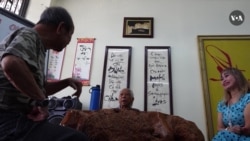Vietnamese Americans weigh in on the immigration debate before the U.S. election.
Welcome to VOA Asia Weekly. I'm Chris Casquejo in Washington. That story is just ahead, but first, making headlines:
Hundreds of junior doctors in India's West Bengal state ignored a court order to return to work. Instead, they staged an overnight sit-in Wednesday to demand justice for a female colleague who was raped and murdered. The doctors want better security at hospitals.
Philippines President Ferdinand Marcos Jr. says powerful pastor Apollo Quiboloy will face sex trafficking charges in Manila before any possible extradition to the United States on similar charges. Quiboloy turned himself in on Sunday.
Japan's Tokyo Electric Power Company says it has restarted trial removal of nuclear fuel debris from the disabled Fukushima Daiichi plant. The preparatory work was suspended in August because of an error installing the extraction equipment. The debris consists of nuclear fuel along with parts of the plant's infrastructure and is estimated to weigh around 880 tons.
Pope Francis arrived in Singapore on Wednesday afternoon for the final leg of his 12-day, four-country tour across Southeast Asia and Oceania. Senior officials greeted him at the airport, along with four children wearing national costume. The Vatican says Singapore counts about 210,000 Catholics among its nearly 6 million people.
More bodies have been recovered after a flash flood swept away an entire village in northern Vietnam, killing 30 people and leaving dozens missing as deaths nationwide from a typhoon and its aftermath climbed to 199 on Wednesday.
More than 1.2 million Vietnamese immigrants live in the United States, many arriving after the Vietnam War. More recently, a new wave of migration has sparked debate in the Vietnamese American community and has become one of the main talking points this election season. VOA’s Elizabeth Lee spoke with voters in Texas, the state with the second-largest Vietnamese immigrant population in the U.S.
For Hong Pham, life in Vietnam versus the United States is like day and night.
“Life was very hard back then. I earned a living as pedicab driver traveling between towns in southern Vietnam.”
When communists took over Saigon in 1975, Pham was sent to a re-education camp for serving in the South Vietnamese military. He eventually made his way to the U.S. on a humanitarian program.
But now a wave of undocumented Vietnamese people is aiming to enter the U.S. through its southern border. The number caught by U.S. Customs and Border Protection jumped from just under 300 in 2022 to more than 3,000 in 2023. CBP logged more than 3,200 so far this year. Attorney Shandon Phan is in touch with some of them.
“If people are not quite educated and they got fed all these false stories about how easy that is, they play with their own life.”
Phan says many migrants pay tens of thousands of dollars to traffickers to make the dangerous trip from Vietnam to China, then Europe, South America and then to the U.S.
Immigration has become a hotly debated issue in this year's U.S. presidential race.
“I don't think there's disagreement on the fact that there are problems with our immigration system. The debate is really about what to do about it. The Trump administration wants to reduce the numbers. The Democratic administration wants to reduce, but really better regulate.”
“Those who flee communism have a legitimate reason to be in the U.S. I’m not in favor of granting asylum to those who come here illegally because of economic reasons.”
While Pham’s views echo those of the older Republicans in the Vietnamese community, some younger Vietnamese Americans who were born in the U.S don’t share them.
“My mom is more conservative. She's one of those people that wants people to come over here legally. And I get that. She is overlooking the fact that everybody just wants to come here and have a better life.”
The migrants who make it here live in limbo, hoping to find work and waiting to see whether the next president will let them stay.
Elizabeth Lee, VOA News, Houston.
Visit voanews.com for the most up-to-date stories.
I’m Chris Casquejo.
Finally, Cuba, the birthplace of salsa and many other rhythms that conquered the world, has surrendered to a K-pop invasion.
Dedicated fans gather in Havana almost every weekend to show their moves to K-pop.
Earlier this year, Cuba and South Korea re-established diplomatic relations.
Thanks for watching VOA Asia Weekly.












